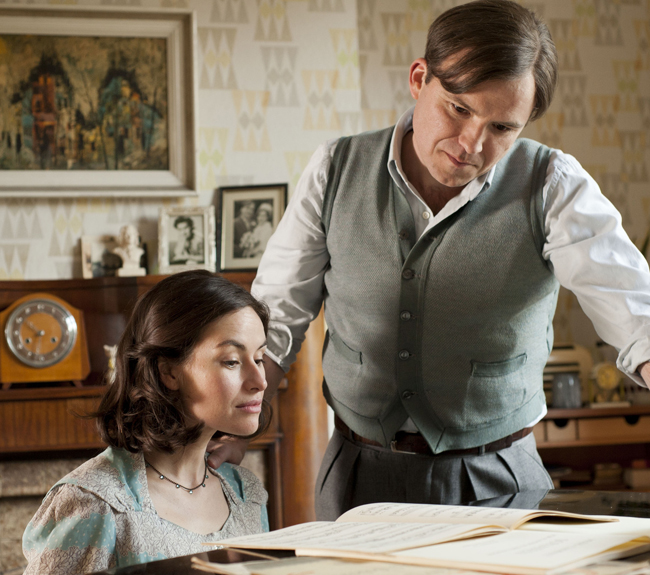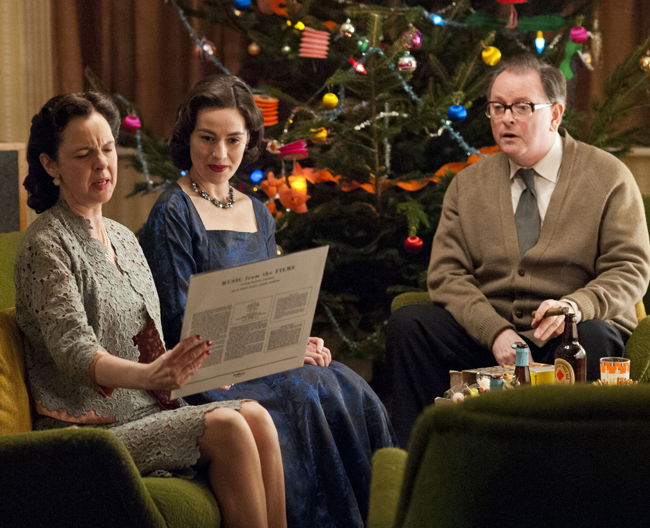Perpetually reborn in movies and TV series, Jack the Ripper rides again in Ripper Street, which is set in Whitechapel in 1889, in the aftermath of the much-mythologised murders. Except this time, the subject isn't the Ripper himself so much as the dread and hysteria he left in his wake, which shrouds the murky streets like poison gas.

The Mayan calendar recently suggested it was all over. It is now, almost. 2012 was, by anyone’s lights, an annus mirabilis for culture on these shores. The world came to the United Kingdom, and the kingdom was indeed more or less united by a genuine aura of inclusion. Clumps of funding were hurled in the general direction of the Cultural Olympiad, which became known as the London 2012 Festival, and all sorts leapt aboard. Just for a start, those opera companies who had been burning to perform a version of Vivaldi's L'Olimpiade could now finally proceed.

“Knowing Clara Bow brought you down socially”. Although one of the biggest and most bankable film stars of the Twenties, luminous fan-favourite Clara Bow wasn’t so treasured by the Hollywood elite. She didn’t hide her affairs. She turned up for dinner in a swimsuit. Her father was an alcoholic and banned from sets. She revealed her deprived background to the press, undermining the myth that stars sprang fully formed from the Elysian Fields. When it came to assessing the silent era in his seminal book The Parade's Gone By, film historian Kevin Brownlow didn’t mention her.

William Boyd wrote the screenplay for this adaptation of his 2006 espionage novel, and since it’s integral to the whole he retained its two-part structure. The first concerns the World War II activities of former British intelligence spy Eva Delectorskaya, the second, set in 1976, concerns her efforts to lay the past to rest. Not only has the past cast a dark shadow over her life but it continues to endanger it. For this she enlists the help of her daughter.

Pantomime is one of the great festive traditions and the version of Dick Whittington envisaged by John Bishop in this one-off comedy drama checked off every single one of the clichés. Taking a writer’s credit alongside Jonathan Harvey of Gimme Gimme Gimme fame, the Liverpool comic drew on his experiences on regional stages near the beginning of his showbiz career in pulling together the script.

The BBC makes a habit of dramatising the difficult lives of those who have entertained us – tortured comedians, anguished singers, even troubled cooks. Whatever you make of their merits, the message accumulating across all these biodramas is that the audience’s pleasure comes at the cost of the artist’s pain. Or as Alfred Hitchcock put it in The Girl, “Who pays our wages? The audience.”
I was going to make a strenuous effort not to give away the ending, but since it's all over the front pages of the newspapers there's not much point. This rambling Downton special spent two hours going nowhere in particular, albeit very charmingly, but Julian Fellowes had been keeping his knuckledusters hidden behind his back. In the closing few minutes, he gave us the new heir of Downton and got rid of the previous one, the much-loved Matthew Crawley.

You have to wonder whether blood, squalor, flea infestations, DIY childbirth and urine-soaked tenements are really the perfect family viewing elixir for 7.30pm on Christmas Day, but the BBC has obviously decided that it's good for us. Or, considering that the ornate and crenellated shadow of Downton looms so large over the festivities, maybe they felt they had no choice but to deploy the Midwife weapon, the Beeb's biggest drama hit in a decade.

Over the past 29 years, annual screenings of the TV adaptation of Raymond Briggs's 1978 picture book The Snowman have become an integral part of Christmas. Now, on the 30th anniversary of its first broadcast, the original has friendly competition from The Snowman and the Snowdog, a new animation featuring the be-hatted, smiling fellow.

Joyce Hatto achieved a rare kind of immortality for being the pianist at the centre of an audacious classical music fraud, in which her husband faked "Joyce Hatto" CDs from the work of other artists and, for a time, enjoyed considerable success with them. The Hatto goose was cooked when the Gracenote music database used by iTunes detected that one of her albums was not her work at all.
A couple of novels based on Hatto-like events have already appeared, but for this TV treatment, writer Victoria Wood stuck to the couple's real-life story, though she had clearly allowed herself plenty of creative width in the process. Joyce Hatto died in 2006, and while her husband William Barrington-Coupe (or Barrie as he was known) is still alive, he has never been terribly forthcoming with the actualité.
 As presented here, Barrie was always a wide boy and a con man, though only in the nicest possible way. However nice that is. Wood's story was a classical game of two halves, the first part, set in the 1950s, telling the story of a talented but shy young musician who barely dared to dream of achieving any kind of success, and the classical musician's agent who vowed to make her an international star. All she had to do was play the piano, and he'd take care of all the rest.
As presented here, Barrie was always a wide boy and a con man, though only in the nicest possible way. However nice that is. Wood's story was a classical game of two halves, the first part, set in the 1950s, telling the story of a talented but shy young musician who barely dared to dream of achieving any kind of success, and the classical musician's agent who vowed to make her an international star. All she had to do was play the piano, and he'd take care of all the rest.
Wood's deft writing was splendidly served by the cast. Rory Kinnear played the young Barrie with a perfect balance of cheeky charm, ambition and dodginess, while Maimie McCoy's fledgling Hatto was almost heartbreakingly naive, sincere and trusting (Kinnear and McCoy, pictured above). Her first meeting with Barrie, when he was bowled over by her as she was working as a rehearsal pianist for an orchestra, established her self-effacing character - "I'm just a rehearsal pianist, not needed on voyage," she muttered bashfully.
The fact that she was also unfeasibly glamorous wasn't lost on Barrie, though her obliviousness to such earthy concerns was drolly illustrated in their wedding night scene. While Barrie was eagerly waiting for her to slip into something more see-through ("let the dog see the rabbit," as he put it, to her bafflement), Joyce's attention wandered to the nearby piano, and she'd soon forgotten about her new husband altogether. "Oh lord!" she exclaimed, as he came back to find her. "Negligée... wedding night... I'm sorry!"
 The 1950s milieu was evoked with painful authenticity, from the drab church halls where Joyce played to local music societies to the humdrum home life of the Hatto family, perhaps with Andy Stewart celebrating Hogmanay on the primitive TV (pictured left). Joyce's mother was played with shrewish impatience by Phoebe Nicholls, and her daughter was too eager to escape to heed her all-too-accurate warnings about Barrie's questionable credentials. But, try as Barrie might to launch his wife as a new classical sensation, eventually they had to face the fact that she somehow lacked the right stuff.
The 1950s milieu was evoked with painful authenticity, from the drab church halls where Joyce played to local music societies to the humdrum home life of the Hatto family, perhaps with Andy Stewart celebrating Hogmanay on the primitive TV (pictured left). Joyce's mother was played with shrewish impatience by Phoebe Nicholls, and her daughter was too eager to escape to heed her all-too-accurate warnings about Barrie's questionable credentials. But, try as Barrie might to launch his wife as a new classical sensation, eventually they had to face the fact that she somehow lacked the right stuff.
Then Wood fast-forwarded us to Royston, Hertfordshire in 2002, where Joyce had morphed into Francesca Annis and Alfred Molina was playing the older Barrie. Decades of disillusion had taken their toll - "living with a disappointed person is hard, it drains the flipping life out of you," as Barrie put it - and Joyce had grown cranky and resentful. Since she was also suffering from cancer, it was difficult to blame her, though the drastic change from her sweet and ingenuous younger self was poignant to behold.
Under the circumstances, Barrie's scheme to invent a fictitious Hatto who had suddenly become a reclusive recording phenomenon in her late years, although unscrupulous and illegal, was quite inspired. Wood evidently also enjoyed the idea that this odd little couple could pull the wool over the eyes of august classical critics from the Gramophone and Radio 3, who hailed the brilliant artistry of the long-lost Hatto (the critic who hailed a Hatto performance but slagged off the same recording by its true performer was, perhaps mercifully, omitted). Eventually, it was largely through the efforts of Gramophone editor James Inverne that the fakery scam was exposed.
Barrington-Coupe has always maintained that his wife was innocent of the fraud, and here it was left ambiguous, with Hatto seeming slightly detached from reality and not really grasping what was going on. Whatever the reality, it made a strangely touching slice of drama.
Homeland reviewed overleaf

